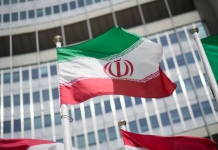DM Monitoring
LONDON: The Berlin Conference on Libya provided hope for stability in the war-torn country as countries committed themselves to the withdrawal of all foreign fighters and mercenaries and the United Nations special envoy welcomed the process.
According to a U.N. statement, Jan Kubis “welcomes the Conclusions of the Second International Conference on Libya (Berlin II).”
However, more needs to be done to consolidate this progress and ensure sustainable stability and peace in Libya, it added. The statement further put forth that the special envoy also stressed the importance of addressing all human rights violations and abuses as well as violations of international humanitarian law in Libya. Kubis urged “all Libyans and external parties to agree on a comprehensive plan, with clear timelines” to achieve the withdrawal of foreign forces in the North African country.
Libyan Foreign Minister Najla al-Mangoush voiced hope that there would finally be progress on a key pledge from the first conference in January 2020 – to pull foreign fighters out.
“We have a progress in terms of mercenaries, so you know hopefully within coming days, mercenaries from both sides (are) going to be withdrawing and I think this is going to be encouraging,” she told reporters.
The withdrawal, which was agreed as part of a cease-fire in October, must be implemented in full and “without further delay,” according to the final declaration from the conference.
All parties must refrain from actions that exacerbate the conflict, including “financing military capabilities or recruiting foreign fighters and mercenaries,” it said.
The seven-page statement notes that Turkey expressed reservations at the conference about the demand for an immediate withdrawal. Turkey has troops in Tripoli, which it argues were sent under a bilateral agreement with the government, implying that they are not affected by a request for foreign troops to leave.
Foreign Minister Mevlüt Çavuşoğlu also attended the talks, tweeting after the meeting: “Emphasized that we will continue to support peace, security, stability and sovereignty of Libya.”
According to German Foreign Minister Heiko Maas, the underlying reason for this discussion has to do with the fact that “regular forces” – for example, those training security forces in the country – should not be compared to mercenaries.
“This has occupied us very intensively today,” Maas said after the conference concluded.
Representatives from 16 countries and four international organizations were at the one-day meeting in Berlin, co-hosted by Germany and the United Nations.
“We will not rest until the last foreign force … has left the country,” Maas stressed. He conceded, however, that this can only happen gradually. The road to peace is not a sprint, but rather a marathon, he said.
Germany and the other participants stressed the importance of planned elections for the peace process.
“Hardly anything is as crucial for peace and stability in Libya as the nationwide elections on Dec. 24,” Maas said.
Maas called for the election date to be respected: “After decades of dictatorship and years of conflict, the people of Libya finally want to be heard.”



